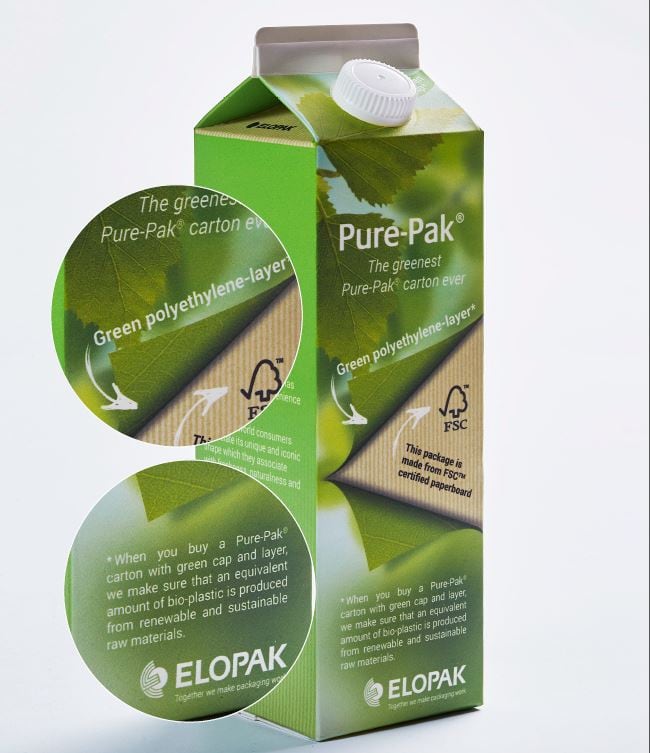The firm claims the carton consists of at least 75% renewable paperboard derived from responsibly managed forests and the remaining materials are mostly made of polyethylene, a polymer usually produced from fossil-based raw materials.
Fresh milk

Kristian Hall, director environment, Elopak Group, told FoodProductionDaily as ‘an industry first’, Elopak uses second generation renewable PE, made of European-sourced biomass not in competition with food supply.
“Elopak is the first company to offer beverage cartons with renewable coating to the European market as Tetra Pak has communicated it will launch its 100% sustainable carton in 2015. Elopak stands ready to offer this to the market today,” he said.
“The type of beverage we will use for this product is mainly fresh milk. We cannot reveal who the supplier of the second generation renewable PE, is just yet. We plan to name the companies we are working in partnership with to boost the environmental merits of their packaging at a later stage.”
Tetra Pak announced in October it will launch a 100% renewable version of its Tetra Rex package, developed in partnership with and produced by biopolymer manufacturer Braskem, from 2015.
The bio-based packages will be available to buy from Swedish production centers in H1 2015 with the roll-out initially planned for European customers, with expansion to other regions based on demand.
Future Proofed Packaging Strategy
Christina Chester, product director, carton gable top, Tetra Pak, hit back at claims that it wasn't the first to market and said the carton has been circulated internally with its partners before its release date of January 2015.
She said it is the first sustainable carton using bio-based low-density polyethylene (LDPE) films and bio-based high density polyethylene (HDPE) caps derived from sugar cane, as well as Forest Stewardship Council (FSC)-certified paperboard.
“At the time of the announcement in October, bio-based packaging material for the Tetra Rex package was available for customers to buy and is available from our converting facility in Sunne, Sweden," she added.
"Customer interest in the new version of the Tetra Rex has been high and a European customer will be launching a product using the packaging imminently. This, we believe will make the Tetra Rex the first 100% bio-based package to have been launched, and the first to be available on the shelves of a European supermarket.”
Elopak wants to replace all fossil-based raw materials with renewable alternatives as part of its ambitious Future Proofed Packaging Strategy - to achieve absolute sustainability with zero net impact on the environment.
“This is a key milestone in Elopak’s efforts to reduce the environmental footprint of our products. We have a vision to deliver products with zero net impact on the environment, and this is an important step towards that goal,” said Hall.
Bio-based plastics are generally made from crops; however in this case the renewable or bio-based PE is produced from biomass from second generation feedstock. This is locally sourced within Europe.
In addition, the bio-based PE is certified through the entire value chain, by the International Sustainability and Carbon Certification system (ISCC PLUS). ISCC PLUS sets strict requirements for sustainability and traceability through the entire value chain, with chain of custody certification based on a mass balance system.
“Renewable PE brings us much closer to our vision of a 100% renewable carton. At the same time, we are further reducing the carbon footprint of the carton,” added Hall.
Elopak’s plants in the Netherlands and Denmark are certified according to the international standards of ISCC PLUS by the third-party auditing company TÜV Rheinland.
